- Home
- Richard Powers
Generosity: An Enhancement Page 2
Generosity: An Enhancement Read online
Page 2
Mason Mason asks the obvious. “Why don’t we write online? Aren’t journals just dead blogs?”
Russell has prepped three days for this question. He defends private writing against writing for any stranger with a search engine. “I want you to think and feel, not sell. Your writing should be an intimate meal, not dinner theater.”
They shrug at his nostalgia. They’ll take a spin in the Wayback Machine, just for the sheer novelty.
Sue Weston details her current artwork. “It’s called ‘Magpie.’ I stand in Daley Plaza, jotting down the things people say into their cells. Then I post it on a tumblelog. Amazing, what people will tell a street full of strangers.”
Roberto Muñoz whispers, “I’m amazed you think that’s ethical.” A hoot comes from the group, and soon it’s an art-student free-for-all. Russell Stone watches his lesson plan vanish.
Adam Tovar describes his automatic spirit writing. “I just let it come.” After a roll-call vote, the class decides that ghosts do indeed exist and are the soul’s upload to virtual storage.
“Writing always comes from beyond the grave, anyway,” John Thornell says. “I mean, either the author or audience is already dead, or will be soon.”
The Algerian watches fascinated, like a child fresh from months in the sick bay, at a tennis match under a spotless sky. The others ignore her, with pretend nonchalance. But when Thassadit does raise her finger, the room freezes. “In my country? During the Time of Horrors . . . ?”
Russell loses her words. Something about her father being shot for writing a letter, but she speaks so serenely it must be a metaphor. Stone knows nothing about Algeria except that it’s a former French colony with an astronomically impossible flag. Their civil war is news to him. The whole world is news to him.
The Berber’s ready grin unnerves the Americans, who return to the ethics of eavesdropping. She resumes watching them, hands peaceful on the table, centered in herself, smiling through the discussion as if it’s the most entertaining feature film.
This first night’s class runs overtime before Russell can get through a quarter of his notes. He assigns them twenty pages from Make Your Writing Come Alive, half apologizing for the text, as if someone else chose it. He gives them their first journal assignment, the one about rescuing one fragment from their last day worth telling a perfect stranger. They’ll read their entries out loud together, two nights from now. “Have fun,” he tells them, avoiding the eyes of the Algerian. “Surprise me.”
Then he stumbles back out through Building Security into the September night. The Loop has quieted. Its 3-D lattice of light now looks like the twitch-grid computer games his brother is addicted to. Nine million lives from here out to the horizon, and God only knows how many art schools calling it quits for the night. Night classes in Lima will follow in an hour. Day classes in Tianjin are already under way.
It strikes me that my adjunct has never heard of Tianjin. He boards the northbound Red Line at Roosevelt, avoiding the sparsely populated cars. The train emerges from its grotto into a canyon flanked by the backsides of brick apartments scaffolded in wooden fire escapes. Tonight’s glow turns tenements into upscale condos. He’s elated by how well his first class has gone. He spends the subway ride scribbling an account of the last two hours into his own journal. He describes his students’ willful naïveté and fearless self-invention. What would life be like, he writes, if art students finally had their revolution?
Russell Stone doesn’t answer his own question. I watch him trying to decide no more than God.
In his studio apartment in Logan Square, he makes himself a one-hand sandwich of wilted veg and cheese, from which he scrapes a thin skin of mold. Then he sits down to find Kabylie. He wants to see it on a printed page, not online. He finds it in the atlas. In the Atlas Mountains. The place is a rugged hideaway, a separatist hot spot full of goats and olive trees, a land graced by all accounts with the most aromatic and beautiful spring known on earth.
He lies in his dark bed, replaying the night’s conversation. Creative nonfiction runs through his head. He needs to be up in four hours, for the long ride back to his daytime editing shift. After forty minutes of mimicking sleep, he rolls over and turns on the light. His journal still waits on the nightstand. Beneath his keyed-up subway entry, he adds: She must be the world’s most blissful refugee.
I give myself a first assignment: Russell Stone in one hundred and fifty words.
Start with this: His earliest crime involved a book about a boy whose marvelous scribbling comes alive. He wrecked every page with crayon, aping the trick. His mother never really forgave him.
He hates books with teacher protagonists. He avoids stories set in any school. He can’t think of a single bildungsroman that seems useful anymore, or beautiful, or even merely true.
Taped to the inside of the desk he inherited from his grandfather, he keeps the Schiller quote found in Melville’s desk after his death: “Keep true to the dreams of thy youth.” His forgotten note awaits the discovery of death’s garage sale.
He dreads the question What music do you listen to?
He’d be pleased to know that in my mind, he’s still mostly white space.
Once, out of character, he scrawled on the bathroom stall at the magazine where he edits, “Manuscripts don’t burn.”
Stone hasn’t kept a journal for years. He shed the personal memoir right around the time that the MyBits Age took off. Self-examination leaves him seasick.
Once he kept florid diaries. From sixteen to twenty-four, he couldn’t see, hear, smell, or taste anything without polishing it into a perfect paragraph. He hoarded great descriptions to spend later, as needed. Before his private wipeout, he filled a whole shelf with spiral notebooks. He has tried to destroy them, but is too cowardly. They’re in his mother’s crawl space, awaiting discovery by a future stranger.
But even as he shrinks from it, the world graduates to runaway first person. Blogs, mashups, reality programming, court TV, chat shows, chat rooms, chat cafés, capital campaigns, catalog copy, even war-zone journalism all turn confessional. Feelings are the new facts. Memoir is the new history. Tell-alls are the new news.
He looks up his students online. All but two have flourishing personal pages. They reel off more intimate specifics than Stone has the courage to read: favorite music, favored drugs, preferred sexual practices, hated movies, crimes they’ve committed, appetites they’ve fed, celebrities they would kill or do or be if they weren’t themselves . . .
Why this is happening Russell Stone can’t say. He himself gave up journals when he realized his life story held no interest even for himself. No: I’m deciding too much, again. He gave them up overnight, shortly after tasting his first public success, in his fourth year in Tucson, just after completing his master of fine arts.
In the course of a dozen dizzy weeks, three leading magazines took his pieces for publication. His work was that contradiction in terms: creative nonfiction. Back then, people still called them personal essays. Russell Stone wrote them to amuse Grace Cozma, the rising star of the Arizona writing program, winner of the coveted Avignon residency, and—still bewildering—ten-time visitor of Russell Stone’s own bed. Grace had told him, with an electrifying squeeze of the ribs on her way out the door to France, that letters during her year abroad would not be unwelcome, providing they amused her. So he wrote her long rambles, as if they were life itself.
He described his run-ins with Southwestern drifters. He told her about the old desert rat who ran a collapsing gem-and-mineral shop not far from Saguaro West. The man claimed to have once done some “groundbreaking work in geology,” swearing to Stone that he was just $10 million short of producing a working prototype of a lightning farm that would “shoehorn the Wahhabis out of the West Wing once and for all.”
Russell polished up the mordant letter to Grace and mailed it to a famous glossy, on a long-shot lark. When—craziest of fantasies—the magazine took the story, Stone went back to his letters to Grace and polished up
another.
In his second piece, he recounted his fast-food-lunch conversation with a Tohono O’odham former EMT who’d just received a two-year suspended sentence for being up on the roof of a clinic with four buddies, a couple of pairs of defibrillator paddles, and a box of 200-gram tubes of paddle gel. “We weren’t doing anything, really.” The second reputable magazine Stone sent it to jumped on it.
The third essay transcribed Stone’s meeting with a narrow-eyed vagrant outside El Con Mall who wanted Stone’s opinion on nerve regeneration, water-powered cars, and the Pseudo-Baldwin. The man warned Russell not to cross him: “I can put the word out to a continent-wide street-person network that’ll make your life hell from Miami to Vancouver . . . We’ve even got contacts in the European Union.” At Grace’s urging, Russell submitted the piece to the Valhalla of New York literary weeklies. The day the impossible acceptance letter arrived, he called Grace in France. They giggled at each other for half an hour.
The secret of these pieces lay in the hapless narrator: bewildered victim of the world’s wackiness. “I seem to be the kind of flavorless, neutral guy whom the truly hard-core outsiders in this life claim for one of their undiscovered own.” The reporter was exactly that goggle-eyed Midwestern rube ripe for conversion whom Grace always found so unwittingly hilarious.
Overnight, these three pieces changed Russell Stone’s life. The magazine payments let him quit his desperate community newspaper job and write essays full-time. Agents called, wanting to represent him. An editor at a major New York house wrote to ask if he had enough pieces for a book.
Public radio commissioned him to write a piece for an omnibus program broadcast on 350 local stations. He wrote and performed a brief burlesque about trying to understand the musings of his Hindu dermatologist, whose sentences began in the Physicians’ Desk Reference and ended in The Ramayana. The producer declared him as droll a voice actor as he was a writer, and offered another ten-minute spot whenever Stone wanted.
“Bravo,” Grace wrote. “How much did they pay you? Enough for a transatlantic ticket and a week of B and B’s?”
Then a letter came, nestled in a batch of reader mail:
Dear Mr. Russell Stone,
The Tohono O’odham Nation faces many challenges. You have just added to them. Charlie Melendez is a decent young man who got in trouble. You’ve profited by mocking both him and our people.
I hope your writing will be less destructive in the future.
Sincerely,
Phyllis Manuel, San Xavier District
Stone agonized for several days over an apology, which he mailed out just before the fan-mail bag delivered a new land mine:
Mr. Stone,
I’m not sure why anyone would laugh at a man who is mentally ill. But I’m willing to forgive you, if you can help me find my father, Stan Newstetter, the man you call “Stan Newton” in your story, “Ear to the Network . . .”
Stone had to confess to Mr. Newstetter’s daughter that he hadn’t really met the man outside El Con, but in a strip mall somewhere in the vast retail wastelands along Speedway, the precise coordinates of which he’d failed to write down. When Julie Newstetter wrote back and asked why he’d said El Con, he had no answer except the name’s comical sound.
A month later, Charlie Melendez tried unsuccessfully to take his own life.
So you know this story: Lord Jim, or a plot to that effect. Not that Stone collapsed all at once. I see him shriveling gradually, over many years. He never told anyone about the letters—not his mother, not his brother, not Grace. He wrote another radio piece, this one about his Jack Russell terrier’s misadventures in obedience school. The producer found it less biting than the first. Stone set to work on a fantasia on his phobia of Adam’s apples—about his recurring fear that they were subcutaneous creatures trying to escape. Grace loved it; pure Stone, she decided. But he couldn’t bring himself to publish the essay. It just seemed so pointlessly, weirdly personal.
He started a wry, detailed description of his mother’s obsession with food supplements. He lingered over her enthusiasm for DHEA, with which she pared herself down to four hours of sleep a night. He described how kavalactones got her elected to the school board. But four thousand words into the portrait, he realized he couldn’t possibly publish it, let alone mail it to Grace. He couldn’t imagine what he’d been thinking, ridiculing his own flesh and blood for anyone to read.
He wrote an account of Pima County estate auctions. Every magazine he sent it to rejected it as polite and lifeless. He composed several short nature features involving no people at all. When even the nature magazines asked him to liven up his accounts with a little quirky presence, he lost heart.
Grace, back from France, called him from New York. She was having trouble finishing her novel. Come out, she begged. Just for an escapade. Or at least send something fresh to read. “Something to unfreeze me. You know: the stuff you do. The wicked stuff. The grotesques. Everybody I’m reading is a patronizing bore.”
He closed his eyes, gripped the phone, and laid out his sins for her, like a literary prize. He told her about Stan Newstetter. She laughed at him, harder than she’d ever laughed at his stories. Book-club moms were podcasting their teenage daughters’ first sexual forays, and he was beating himself up for misrepresenting street people? He was crazy. Worse: he was threatening to become tedious.
He told her about Charlie Melendez. She couldn’t understand. “You didn’t make that man hurt himself. He volunteered everything.”
He confessed that he hadn’t run the piece past Charlie before publication.
They argued. She hung up on him. He vowed he wouldn’t pick up for her the next couple of times she called. She never gave him the chance. Eighteen months later, her novel was published. It included a hilarious portrait of a small-town reporter terrified that his human interest stories were returning to haunt him.
He went back to his community newspaper job. But his interview subjects no longer opened up to him. After half a year, he lost all ability to put together a basic lifestyle feature. He considered returning to grad school, to train as a political correspondent or economics reporter.
He could no longer read anything even vaguely confessional. Intimate revelations or domestic disclosures creeped him out. He dosed himself with popular science and commodity histories—how the spice trade or the cultivation of the bee set mankind on an unforeseen destiny.
Best of all, he liked the white space, the virgin territory bordering a page. All his life he used to ink up that space, fill it with passionate editorial: Couldn’t have said it better myself or Stop this argument before it kills again! Now he no longer wrote in books. In fact, he started making the rounds of Bookman’s stores, buying up the best impersonal books faster than he could read them, just to save them from scribblers.
He left Tucson. He returned to Aurora, to live with his mother in his boyhood home in the Fox Valley. His brother was still there, working for a satellite-dish company. Russell got a job in construction. The clean, repetitive tasks were best. He loved to staple insulation, to cut and nail large square pieces of Sheetrock to freshly plumbed studs. When he was in the flow, even his boss’s hate-mongering talk radio didn’t bother him.
He installed things for his mother: new kitchen cabinets, which she loved; oak bookshelves, which she couldn’t fill. He dated sometimes—kind women who were after exactly nothing. Many nights, he and his brother played long matches of deferential Ping-Pong in the basement on the warped table of their childhood. He read himself to sleep on Silkworms and Civilization and A Small Guide to the Big Bang.
He went to his ten-year high-school reunion. The prospect held no more dread than any working day. He didn’t mind listening to his successful classmates’ achievements. He almost enjoyed telling his own riches-to-rags story. Confession was his only penance.
A former buddy from the sophomore year 4 × 100 relay was intrigued. “You’re a published writer?”
Was, Russell cor
rected.
The buddy—accomplished deadbeat throughout his youth—had hit on a publishing scheme that threatened to turn him into a philanthropist. He’d founded a self-improvement magazine called Becoming You. Foods, workouts, lifestyles, finance: one of thousands, yes. But Becoming You had a twist: all the copy was subscriber-generated. And all subscriber-contributors were paid in quantities of advertisers’ goods. Write a feature on how micronutrients reversed your declining memory, and you won a year’s supply of Pom-a-Grenade antioxidant cocktail. Advertising exposure, underwritten costs, deeply involved subscribers, and the wisdom of crowds combined to leverage the zeitgeist.
Come to Chicago, the buddy told Russell Stone. Become a part of Becoming You.
Russell demurred: he no longer wrote for publication. But the buddy didn’t need Stone’s writing. He needed Stone to turn scores of semiliterate, fervent testimonials into something readable.
The offer felt oddly appealing. True, the pieces would be personal in the worst way. But the person in question wouldn’t be Russell Stone. Ghosting for amateurs was the perfect contrition.
Russell worked the job as if volunteering for a humanitarian NGO. With his new income, he found a Logan Square studio and decorated it with dozens of pastel scenes that he drew, now that Ping-Pong no longer filled his evenings. The ten-by-ten-inch pictures showed bright, fluid human figures caught in the process of becoming lakes, clouds, or trees.
Say he eventually fell in with Marie White, a giving soul who loved to come over and read in bed next to Russell while he edited. They never chafed over anything, except his paintings. Marie thought he had a gift, and people with gifts were morally obligated to develop them. Russell just laughed at her, which stung Marie into silence.
After fourteen months, Marie wrote him a full-page note on Matisse stationery saying she was afraid that Russell might be melancholic, which kind of made her love him, but she couldn’t afford to sacrifice her life to his disease. She had to get on with making her own future, and she hoped that Russell would do the same. She was thinking of starting to see someone—a kind gallery owner, in fact. And if Russell ever finally realized how nice his paintings were, she could put him in touch . . .

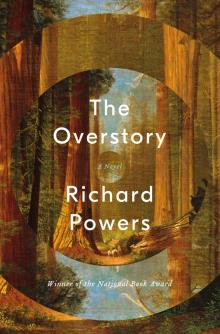 The Overstory
The Overstory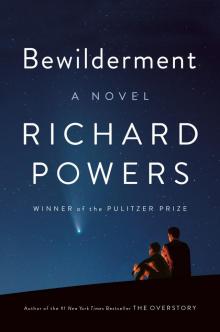 Bewilderment
Bewilderment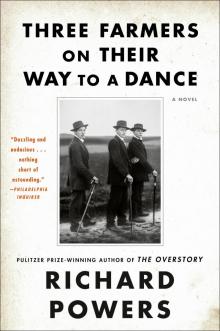 Three Farmers on Their Way to a Dance
Three Farmers on Their Way to a Dance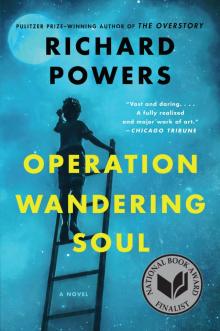 Operation Wandering Soul
Operation Wandering Soul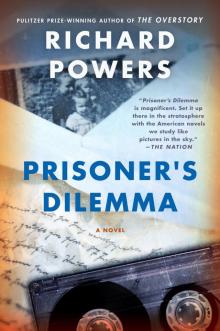 Prisoner's Dilemma
Prisoner's Dilemma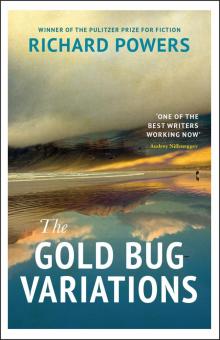 The Gold Bug Variations
The Gold Bug Variations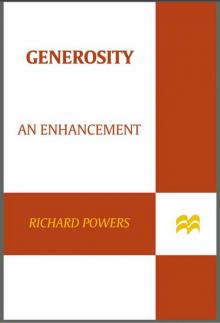 Generosity: An Enhancement
Generosity: An Enhancement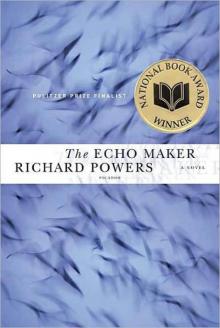 The Echo Maker
The Echo Maker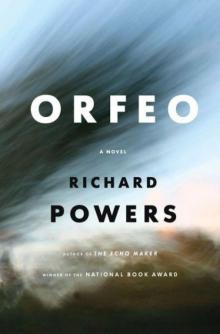 Orfeo
Orfeo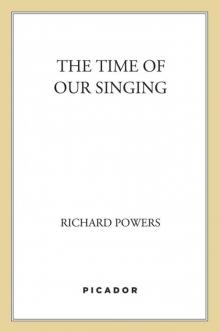 The Time of Our Singing
The Time of Our Singing PLOWING THE DARK
PLOWING THE DARK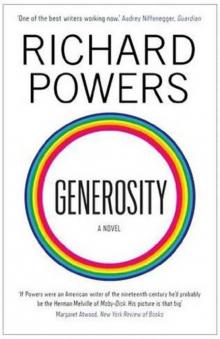 Generosity
Generosity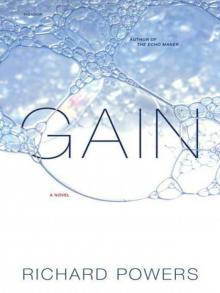 Gain
Gain